A History of the Mishnaic Law of Women (5 vols.)
Digital Logos Edition
Overview
Distinguished professor and scholar of Judaic studies, Jacob Neusner, examines the Mishnaic law of women in this five-part collection. The Mishnaic law of women defines the position of women in the social economy of Israel during early rabbinic times, both in natural and supernatural terms. These laws reflect a system in which what women do on earth provokes a response in Heaven, and the position of women in Heaven and on earth is invariably relative to men. In the first four parts, Neusner provides an in-depth analysis of each chapter within the Mishnah tractates of the law of women. In the fifth and final part, he concludes his research of these laws by explaining how they formed and changed over time.
In the Logos editions, these volumes are enhanced by amazing functionality. Important terms link to dictionaries, encyclopedias, and a wealth of other resources in your digital library. Perform powerful searches to find exactly what you’re looking for. Take the discussion with you using tablet and mobile apps. With Logos Bible Software, the most efficient and comprehensive research tools are in one place, so you get the most out of your study.
Looking for more resources on women and Judaism? Check out Jewish Women Collection.
Looking for more from distinguished Jewish scholar Jacob Neusner? Try the Jacob Neusner Jewish Studies Bundle, 99 volumes on Jewish history, religion, philosophy, and more.

- Offers translations and explanations of each of the tractates in the Mishnaic law of women
- Gathers extensive research from primary sources
- Includes detailed appendices, bibliographies, and lists of abbreviations and transliterations
- Title: A History of the Mishnaic Law of Women
- Editor: Jacob Neusner
- Series: Studies in Judaism in Late Antiquity
- Publisher: Wipf & Stock
- Publication Date: 2007
- Volumes: 5
- Pages: 1,240
- Resource Type: Monographs
- Topic: Judaica
- A History of the Mishnaic Law of Women, Part 1: Yebamot: Translation and Explanation
- A History of the Mishnaic Law of Women, Part 2: Ketubot: Translation and Explanation
- A History of the Mishnaic Law of Women, Part 3: Nedarim, Nazir: Translation and Explanation
- A History of the Mishnaic Law of Women, Part 4: Sotah, Gittin, Qiddushin: Translation and Explanation
- A History of the Mishnaic Law of Women, Part 5: The Mishnaic System of Women
This title is included in the following collections
You can save when you purchase this product as part of a collection.
Jacob Neusner Jewish Studies B...
$1,214.99$1,214.99Wipf and Stock Ultimate Collec...
$11,593.84$8,499.99
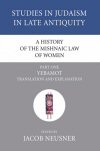
This is the first of a five-part presentation of the Mishnaic law of women. Jacob Neusner provides a translation and explanation of Yebamot, the Mishnah tractate that deals with the heavenly intervention into the formation and dissolution of marriage, the effect of death on the marital bond, and the dissolution of that bond through death. Neusner examines Yebamot chapter by chapter, comparing the themes in it with those found in other Mishnah tractates and other passages of Scripture.
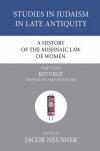
In this second part of Jacob Neusner's examination of the Mishnaic law of women, he provides a translation and explanation of Ketubot, the Mishnah tractate that deals with marriage contracts, specifically regarding such issues as spousal death, divorce, and alimony. Neusner outlines Ketubot chapter by chapter, comparing the themes in it with those found in other Mishnah tractates and other Scripture.
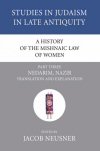
This is the third of a five-part analysis of the Mishnaic law of women. Jacob Neusner provides a translation and explanation of two separate Mishnah tractates: Nedarim and Nazir. Nedarim deals with vows, while Nazir pertains to the right of the husband to annul his wife’s vows. Neusner examines both tractates chapter by chapter, comparing the themes in them with those found in other Mishnah tractates and other Scripture.
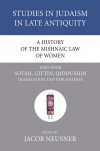
In the fourth part of Jacob Neusner’s breakdown of the Mishnaic law of Women, Neusner provides a translation and explanation of the following Mishnah tractates: Sotah, Gittin, and Qiddushin. Sotah pertains to the accused wife who is forced to submit to her husband if he expresses jealousy concerning her behavior. Gittin deals with the shift in a woman’s status from being consecrated to a single man in marriage to being unconsecrated, and free to marry again. Qiddushin pertains to the consecration of a woman through betrothal to a particular man. Neusner examines these tractates chapter by chapter, comparing the themes in them with those found in other Mishnah tractates and other Scripture.
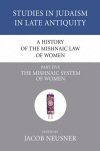
In this volume, Jacob Neusner evaluates in great detail the Mishnaic Law in regard to the system of women. He covers such topics as establishing a marital bond, the material rights of the parties to the marital union, delivering and preparing a writ of divorce, property arrangements, and the death of a husband.
Jacob Neusner is research professor of theology and senior fellow of the Institute of Advanced Theology at Bard College.